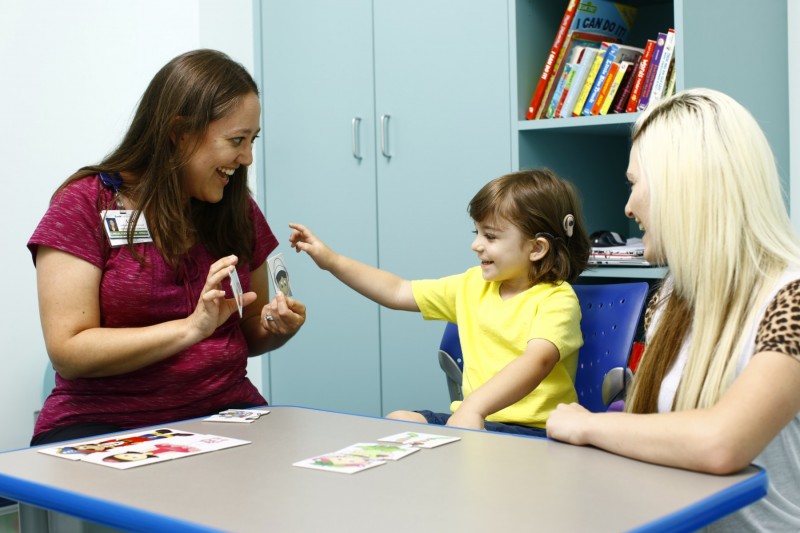Does My Child Have a Voice Disorder? Cook Children's Speech Pathologist Shares What Parents Should Know
By Alex Surdo
Voice issues can be difficult to detect in anyone, especially children. You might sense that something sounds “off” with your child’s voice. Maybe their voice sounds rough, or raspy, or strained, or breathy.
First of all, what is a voice disorder?
According to the American Speech-Language-Hearing Association (ASHA), a voice disorder occurs when voice quality, pitch and loudness differ or are inappropriate for an individual’s age, gender, cultural background or geographic location. 
Sometimes an older child can sense their voice is different and even though other people may not notice it, it’s impacting their self-esteem at school and with their friends. That can be considered a voice disorder, too.
It might be harder to tell in our little ones, so what should we look for?
Some signs and symptoms that you might be able to perceive in your own child include:
- rough or raspy vocal quality
- breathy vocal quality
- strained vocal quality (tense or harsh)
- abnormal pitch (too high, too low, breaks, decreased range)
- abnormal loudness/volume (too high, too low, decreased range, unsteady volume)
- running out of breath quickly when talking
- frequent coughing or throat clearing
- excessive throat tension/pain/tenderness
There are different causes for voice disorders ranging from structural to functional. What does that mean?
Voice disorders caused by an underlying structural issue can include paralyzed vocal cord(s), blisters or callouses on the cords or damage to the nerve in the brain that controls our voice.
Functional voice disorders are more common and are caused by abuse, misuse, and overuse of the vocal cords. 
If your child screams a lot and they have a raspy voice, it could be from vocal cord abuse. That might sound a little confusing – my child is “abusing” his voice?
The tissue of the vocal cords is fragile, so if they come together too forcefully as they do with coughing, throat clearing, and screaming, they can become irritated. With repeated injury, it can cause callouses (nodules) to form on the vocal cords. This will prevent the vocal cords from closing all the way, allowing more air to come through which makes that raspy or breathy quality. In more severe cases, bleeding can occur on one of the vocal cords.
Other things that may possibly be hurting your child’s voice:
- Too much caffeine
- Not drinking enough water
- Whispering
- Making funny noises
- Smoking or being around smoke
- Uncontrolled allergies or reflux
If your child isn’t using their voice properly, what can you do to help?
The no. 1 recommendation is good vocal hygiene. Encourage your child to:
- Drink plenty of water
- Avoid clearing their throat and coughing. Instead: swallow hard or take small sips of water
- Talk in a normal voice; don’t whisper or yell
- Limit caffeine intake
- Talk with their doctor about managing allergies and reflux
- Have quiet periods when they can rest their voice
What if those do not help? Talk to your doctor about speech therapy.
Speech Therapy
As speech therapists, we can help your child learn to use their voice in a healthier way. We teach that this starts at the power source: the breath.
Children can modify how they use their voice through a variety of strategies, such as breathing techniques, stretches to decrease tension in the neck and exercises for proper breath control that will create a strong, healthy voice.
If your child is experiencing any of these symptoms, reach out to their primary physician to discuss a potential referral to an ENT (otolaryngologist) for further diagnostic testing.
We only have one voice and we want to protect it.
Speech Therapy at Cook Children's 
Children learn to babble and talk at different times. Before you know it they can read their favorite book or tell you what they want for their birthday. But, when they can't tell you what they want to eat for breakfast or the daycare teacher can't understand what they say, parents need somewhere to turn.
Choosing our team
At Cook Children's Rehabilitation Services, our speech-language pathologists are highly skilled and experienced in children's communication development. They work with parents and families to help their children communicate their wants and needs. Many of our therapists have additional training and experience in specialty areas. We also have bilingual therapists on staff that treat a variety of communication and feeding difficulties. Go here to learn more about Speech Therapy at Cook Children's.
